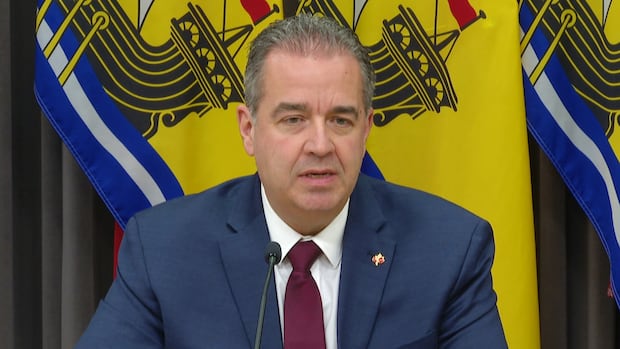New BrunswickAfter the New Brunswick government released its five-year strategic plan for accessibility, some advocates for people with disabilities are hopeful but also wary. Goal of 5-year strategic plan is to make a ‘more accessible New Brunswick by 2040’Hannah Rudderham · CBC News · Posted: Nov 08, 2025 5:00 AM EST | Last Updated: 3 hours agoListen to this articleEstimated 5 minutesThe audio version of this article is generated by text-to-speech, a technology based on artificial intelligence.Jean-Claude D’Amours, minister of post-secondary education, training and labour, says the strategy plan came together with advice from the Accessibility Advisory Board, input from people and groups, research and the experience of other provinces. (Silas Brown/CBC)Advocates for people with disabilities reacted to New Brunswick’s five-year strategic plan on accessibility this week with a mixture of hope, optimism and wariness.At the announcement of the strategy, Jean-Claude D’Amours, minister of post-secondary education, training and labour, said it lays out how government will work with New Brunswickers who experience barriers and with “all sectors” to achieve the goal of a “more accessible New Brunswick by 2040.”Marisa Hersey-Misner, the chair of the Saint John Ability Advisory Committee, said she’s happy the province is in the process of meeting with people and doing the work.“That being said … when the minister had stated 2040, I just cringed,” said Hersey-Misner, who is legally blind and uses a guide dog.She said there are so many systemic accessibility barriers, such as built-environment barriers and communications, that it’s hard to imagine waiting nearly 20 years for action.“I think we’re going in the right direction, but it’s moving very, very slowly,” Hersey-Misner said.The plan has three main goals: Work with all sectors to identify and remove barriers, create a strong culture of accessibility, and develop and enforce accessibility standards.One of the guiding principles in the plan says people with disabilities must be involved in the decisions that affect them. WATCH | Accessibility Advisory Board to make recommendations to government:Province says new accessibility plan will lead to regulatory changesThe provincial government has released the first strategic plan for improving accessibility in New Brunswick.Hersey-Misner said this is important because people with disabilities know what the barriers are. At the same time, she said, she has participated in a lot of advisory opportunities but it hasn’t always brought results as quickly as she’d like.“You get involved in these things, thinking, ‘Oh, they’re going to do that tomorrow’ … and then it doesn’t happen for like, 20 years or whatever,” she said. “And this is the reason why the 2040 date is really concerning to me.”She hopes that while consultation and planning continue to happen for the 2040 deadline, there will be real work at making life more accessible and building the culture of accessibility. Randy Dickinson, the chair of the Premier’s Council on Disabilities, is a member of the Accessibility Advisory Board, which provides advice to the government on the implementation of the Accessibility Act. Randy Dickinson, the chair of the Premier’s Council on Disabilities, said working toward a culture of accessibility will also benefit those without disabilities, too. (Shane Fowler/CBC)He said he has already encouraged shortening the 2040 deadline in his role with the advisory board, but he also recognizes that there are a lot of complex issues to be addressed that will “require very specific standards and regulations to be developed.”“The good news is some of the other provinces have already had their accessibility legislation in place a bit longer, and they developed standards and regulations,” he said. “We’ll be able to, you know, adapt those and use them here in New Brunswick as well. But the accessibility advisory board will not be able to wave the magic wand and change everything overnight.”Dickinson said when the plan talks about removing barriers, it doesn’t just refer to built environments — it also refers to barriers to inclusion, transportation, employment, education, communication and recreation.And working toward a culture of accessibility will also benefit those without disabilities, too, Dickinson said.“If you have a ramp to get into the retail establishment or the office government services, it’s not only good for the person like me in a wheelchair, but it also provides access for the mother with the baby stroller or the delivery person that’s bringing a pallet of bottled water to put in the vending machines,” he said.Shelley Petit, the chair of the New Brunswick Coalition of Persons with Disabilities, said she is pleased that the plan talks about the culture of accessibility, “because not all accessibility plans do.”But overall, she said, removal of barriers across all sectors may be too ambitious.For example, the plan said it would support small businesses and community organizations in identifying and removing barriers. Petit said this might be ifficult.“I think that they can remove the bulk of barriers in government buildings, that would be nice, and the bulk of barriers around communications, again, especially from government,” said Petit. Shelley Petit, chair of the New Brunswick Coalition of Persons with Disabilities, said she worries the plan is too ambitious. (Submitted by Shelley Petit)“But a lot of these small mom and pop businesses, which we have a lot of in the Maritimes, are not going to be able to put in automated doors and floor tracks to help people who use white canes and hearing loops to help those who are low hearing.”Dickinson, who has been an advocate for people with disabilities for over 50 years, the plan has him excited and optimistic for the future.“This has the potential for transformational change, especially for the next generation of people with disabilities that will be coming forward to benefit from the work that’s being done under the Accessibility Act,” he said.ABOUT THE AUTHORHannah Rudderham is a reporter with CBC New Brunswick. She grew up in Cape Breton, N.S., and moved to Fredericton in 2018. You can send story tips to hannah.rudderham@cbc.ca.With files from Information Morning Fredericton
Province releases accessibility plan for N.B., some advocates cautiously optimistic











